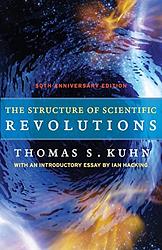The Structure of Scientific Revolutions by Thomas Kuhn
This influential book examines the history of science, focusing on the process of scientific revolutions. The author argues that scientific progress is not a linear, continuous accumulation of knowledge, but rather a series of peaceful interludes punctuated by intellectually violent revolutions. During these revolutions, known as paradigm shifts, the old scientific worldview is replaced by a new one. The book also popularized the term 'paradigm shift' and challenged the previously accepted view of science as a steadily progressive discipline.
The 204th greatest book of all time
Ranking Details:
Our ranking system awards points to books based on their appearance and position on curated lists. Here's how it works:
Unranked Lists: For lists without specific rankings, each book receives points equivalent to the list's weight. This approach recognizes the book's inclusion on prestigious lists.
Ranked Lists: Books on ranked lists receive points in two ways:
- Base Points: Initially, every book is awarded points equal to the list's weight, acknowledging its significance.
- Bonus Points: Additionally, books earn bonus points based on their ranking. The total bonus pool, equal to 100% of the list's weight, is distributed among the books, with higher-ranked books receiving more points.
Exponential Distribution: The distribution of bonus points follows an exponential model. This means the top-ranked book (#1) receives significantly more bonus points than those further down the list (e.g., #100). Our algorithm ensures that higher placements are rewarded more generously, reflecting the achievement of a top rank on any given list.
This scoring system ensures that each book's ranking reflects both its presence on multiple lists and its positions within those lists, providing a comprehensive measure of its acclaim and popularity.
Total Points: 1393
Since this book was first published in 1962, there is a penalty of 0%. The age adjusted score is 1393.0.
This is to prevent newer books from reaching super high on the ranked list of the greatest books of all time. The greatest books should also stand the test of time.
- score: 142 -- The 100 Best Non-Fiction Books of the Century (Weight: 138)
- score: 126 -- The 75 Best Books of the Past 75 Years (Weight: 126)
- score: 114 -- The Hundred Most Influential Books Since The War (WW2) (Weight: 114)
- score: 114 -- The 100 Greatest Non-Fiction Books (Weight: 114)
- score: 108 -- The Modern Library | 100 Best Nonfiction (Weight: 108)
- score: 106 -- The Modern Philosophical Classics (Weight: 96)
- score: 99 -- The New Lifetime Reading Plan (Weight: 99)
- score: 96 -- 100 Most Influential Books of the Century (Weight: 96)
- score: 90 -- Our Users' Favorite Books of All Time (Weight: 90)
- score: 90 -- 72 Philosophy Books Everyone Should Read (Weight: 90)
- score: 84 -- Select 100 (Weight: 84)
- score: 75 -- The 100 Best Nonfiction Books of All Time (Weight: 75)
- score: 63 -- 100 Major Works of Modern Creative Nonfiction (Weight: 63)
- score: 45 -- The 100 Most Influential Books Ever Written (Weight: 45)
- score: 39 -- 1,000 Books to Read Before You Die: A Life-Changing List (Weight: 39)

